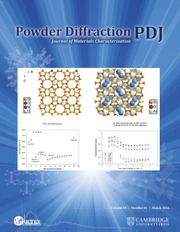Article contents
Development of a quantification method for quartz in various bulk materials by X-ray diffraction and the Rietveld method
Published online by Cambridge University Press: 03 April 2012
Abstract
Crystalline silica is known for its health hazards, and since 1997 has been listed as Group 1, Carcinogenic to Humans, by the International Agency for Research on Cancer. This issue is particularly important in the industrial environment, and there is still no method that allows quantification of the different polymorphs of crystalline silica. Many analytical methods have been proposed, and the major problem in almost all cases is attributable to the very large variety of matrixes encountered. This study evaluates the potential of X-ray diffraction techniques and an automated Rietveld analysis in order to overcome this problem and to adapt the quantitative analysis of quartz, the most prevalent crystalline silica polymorph, to routine analysis in the health and safety environment. Matrix simulations are done and many parameters are optimized. Sample preparation, the acquisition program, pattern treatment, and Rietveld refinement are evaluated, and a general procedure is determined. Automation of Rietveld refinement leads to a significant reduction in analysis time, but cannot be applied to every type of sample.
- Type
- Technical Articles
- Information
- Copyright
- Copyright © International Centre for Diffraction Data 2012
References
- 9
- Cited by


